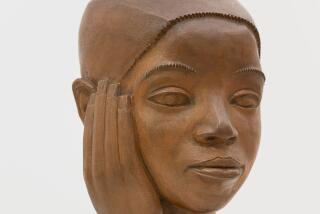‘Grand Generation’: Folksy Legacy Unfolds in Fullerton
- Share via
Earnest Bennett, 83, learned to whittle as a child on his family’s farm in rural Kentucky. Decades later, after retirement, he returned to woodcarving. Crafting intricate chains from a single piece of wood and miniatures of tools he once used to harvest wheat, he keeps his past alive and transmits it to others.
“I like to show young kids what it was like when I was a boy,” says Bennett, who has described life on a farm while demonstrating whittling skills for children at a museum in his hometown of Indianapolis.
Elderly Americans such as Bennett, and the contributions they make by preserving tradition and culture, are the focus of “The Grand Generation: Memory, Mastery, Legacy,” an exhibit organized by the Smithsonian Institution opening today at the Fullerton Museum Center.
Bennett’s delicate miniatures are among more than 60 objects on view. Included are other woodcarvings, embroidery, quilts, pottery, baskets and paintings by people in their 60s, 70s and 80s from various ethnic groups and regions across the nation.
Photographs in the show feature artisans whose labors are less easily displayed in public. There is, for instance, Mrs. T.A. (Mamoo) Lewis, gleefully proffering the hefty “soggy coconut cake” that won her gastronomic fame and admiration among friends, family and neighbors.
“Older people are often bearers of tradition in their families and communities,” the exhibit’s curator, Marjorie Hunt, a folklorist at the Smithsonian Institution in Washington, said in a phone interview. “They have knowledge of ways of life in the past and how things have changed.
“So often, the elderly are viewed as a problem,” Hunt continued. “We’re not saying that old age is not all rosy, by any means. There’s failing health, the loss of loved ones and retirement and the loss of identity. But many people have struggled and triumphed over these problems and have created expressions of great meaning and beauty.”
The key role that memory (as in “Memory, Mastery, Legacy”) plays is seen easily in Bennett’s work, or in Ina Hackett Grant’s quaint “Farm and Home Memories” quilt which embodies information about a time, place and life style that the artisan from Vermont wanted not to be forgotten.
“In 172 embroidered blocks, Grant captures her most precious memories of living on a farm, raising her family, working her garden, helping with the harvesting of hay,” Hunt said.
“Memories of older people are important for all of us. They can provide us with a sense of continuity, who we are, where we come from. This concept leads to mastery. Older people are not only cultural repositories, but active creators and shapers of tradition. They have refined their art over a lifetime so that they become undisputed masters of their art form, whether that be crafting a saddle, building a boat, making a cake or recounting family history.”
As for legacy, “older people pass down their memories and mastery, their knowledge and skills,” Hunt said. “Younger generations benefit from this, and it’s important to older people too. They know that their experience and knowledge will live on.”
“The Grand Generation” grew out of a program about the elderly that Hunt coordinated at a 1984 festival of American folk life at the Smithsonian. “We hoped (a traveling exhibit) would generate educational programs that would prompt people to think about older people as living treasures,” she said.
Four educational programs will be offered at the Fullerton Museum Center in conjunction with the exhibit: An “Oral History Workshop” on preserving family history is scheduled for today; “Family Fun!” will feature participatory story telling on Aug. 19; and “Quilt Demonstrations” will be Aug. 26 and Sept. 9.
“The Grand Generation: Memory, Mastery, Legacy,” organized by the Smithsonian’s Office of Folklore Programs and appearing under the auspices of the Smithsonian Institution Traveling Exhibition Services, will run at the Fullerton Museum Center, 301 N. Pomona Ave., Fullerton, through Sept. 10. Hours: 11 a.m. to 4 p.m. Tuesdays, Wednesdays, Saturdays and Sundays; 11 a.m. to 9 p.m., Thursdays and Fridays. Admission: $2 for adults, $1 for students and senior citizens and free to museum members and children under 12. Information: (714) 738-6545.
More to Read
Sign up for The Wild
We’ll help you find the best places to hike, bike and run, as well as the perfect silent spots for meditation and yoga.
You may occasionally receive promotional content from the Los Angeles Times.






